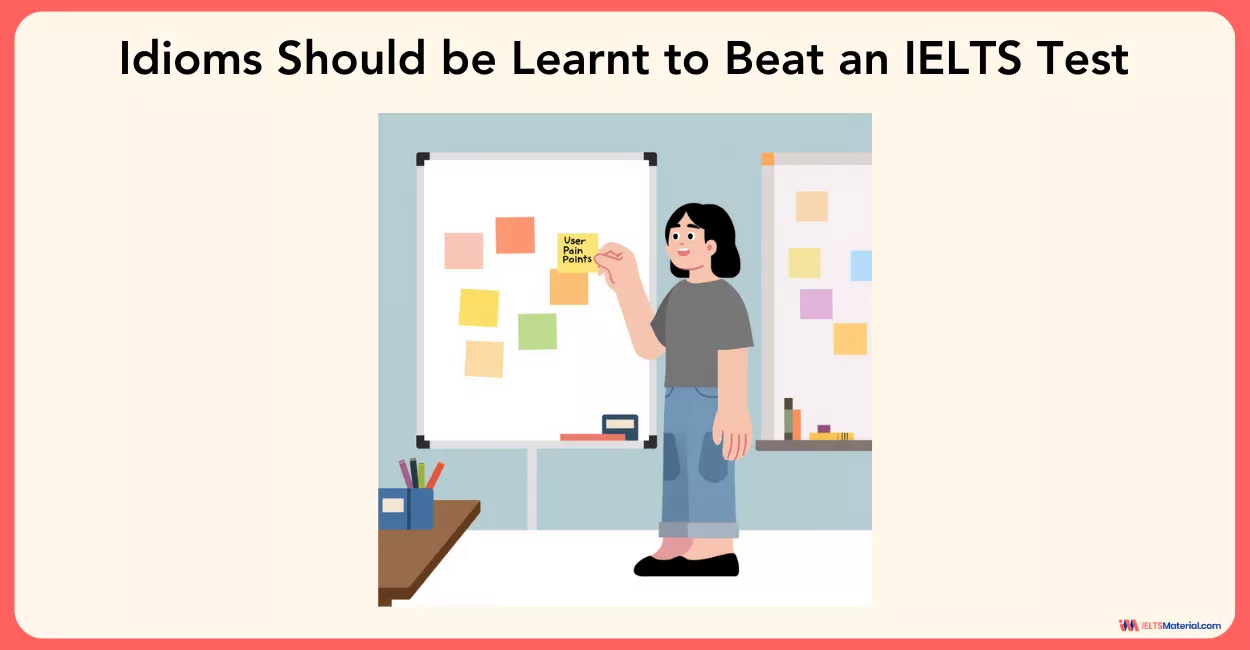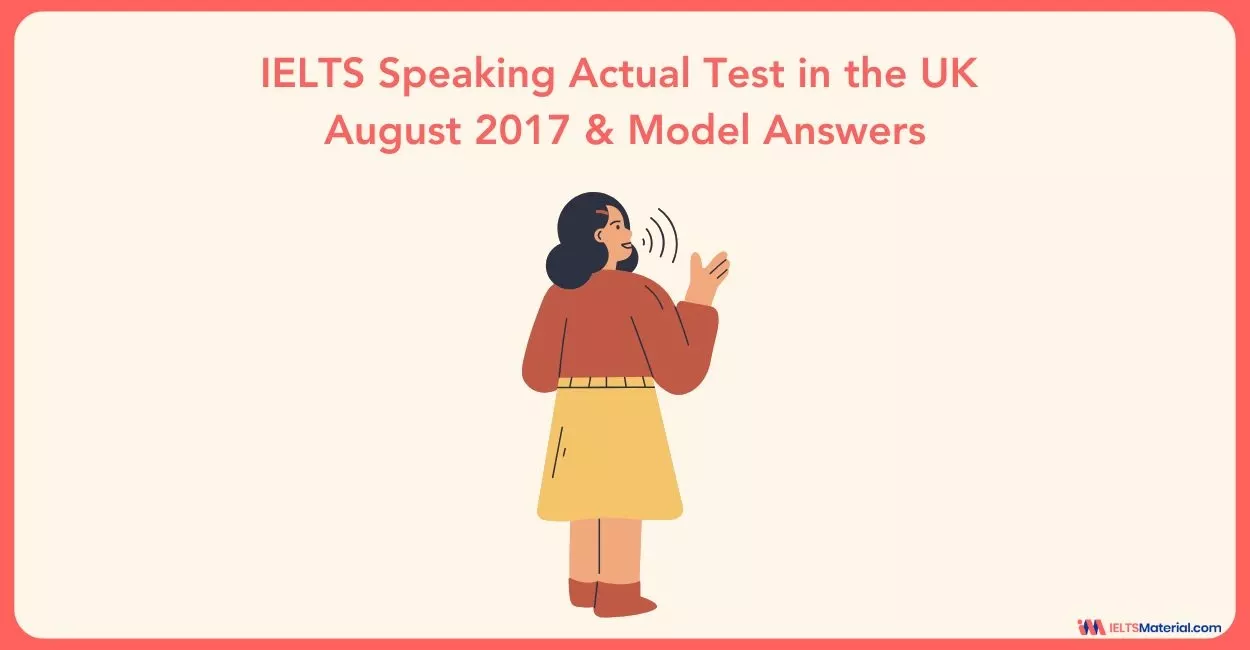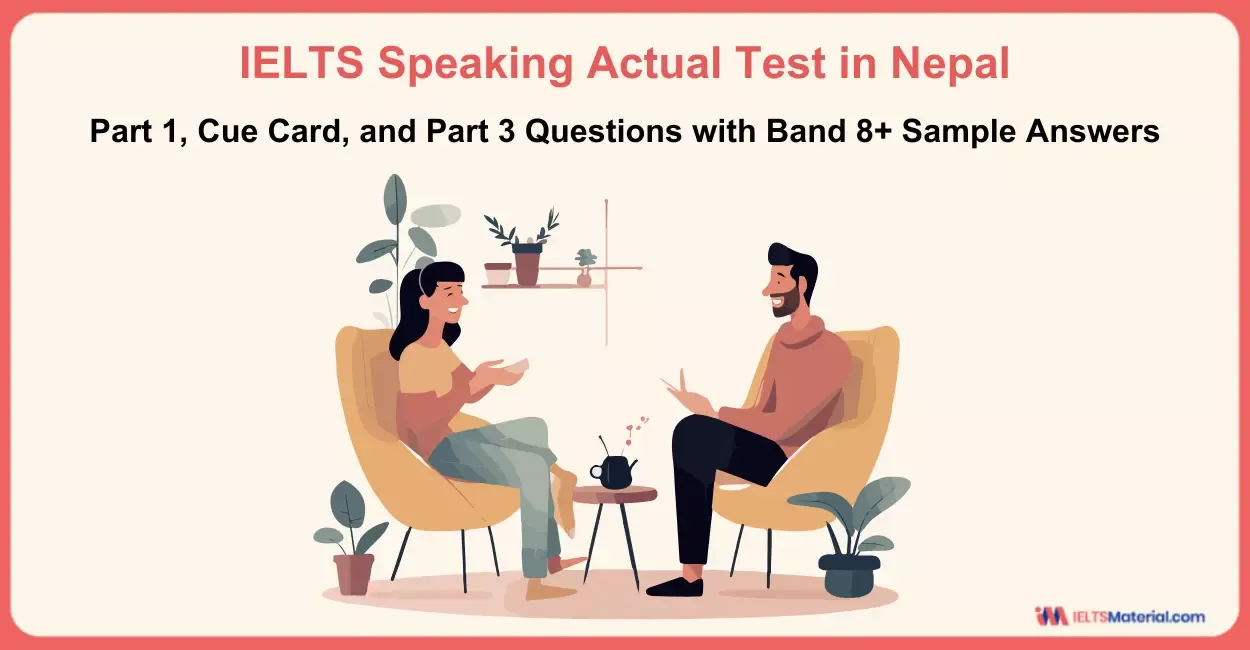IELTS Speaking - Everything about Speaking Part 1, Part 2, & Part 3
-
Copy link

Predicted Cue Cards Topics 2024
“Prepare for the IELTS Speaking test with our comprehensive guide covering Parts 1, 2, and 3. Explore expert tips, practice questions, and strategies to improve your confidence and test performance to acquire a band score of 8+.“
The IELTS Speaking test evaluates your ability to communicate effectively in English. It's a crucial component of the IELTS exam, assessing your fluency, vocabulary, grammar, and pronunciation. The best approach to attempt this section would be constructing a well-structured answer with a varied vocabulary. Remember to practice answering on the common topics, improve your intonation, and follow the structure for each part which will contribute a great deal in boosting your band score.
In this comprehensive guide, we'll explore the three parts of the IELTS Speaking test, provide sample questions and answers, and share valuable tips to help you excel. Just keep in mind that one must stay calm, speak naturally, and engage in a smooth conversation to achieve a band 8+. With the right strategy and consistent preparation, you would surely ace the IELTS Speaking test.
Let's dive into the IELTS Speaking Section!
What is IELTS Speaking Test?
The IELTS Speaking section is a face-to-face interview of 11-14 minutes duration between you and an examiner, where you will be assessed on your ability to communicate in English. It tests your fluency, pronunciation, grammar, and vocabulary. The test is divided into three parts which are shown in the table below.
| Speaking Part | Description |
| Part 1 | Introduction and general questions about yourself and familiar topics (4-5 minutes). |
| Part 2 | You will be asked to speak for 1-2 minutes on a given topic for which you will get a minute to prepare. |
| Part 3 | In this section, the examiner will ask more complex questions based on the topic from Part 2. |
Understanding the structure of the IELTS Speaking test is crucial for your preparation. Each part of the test requires different skills, and being familiar with the types of IELTS Speaking questions you'll encounter can greatly improve your performance. Not sure how the IELTS Speaking test is conducted? See the infographic for more information.

Let's take a closer look at what happens in each part of the IELTS Speaking test.
IELTS Speaking Part 1: Introduction and Interview
In IELTS Speaking Part 1, the examiner will ask you general questions about yourself, your family, work/studies, interests, and other familiar topics. This section evaluates your ability to communicate opinions and information on everyday subjects.
IELTS Speaking Part 1 Sample Questions
In the beginning of the IELTS Speaking test, the examiner will ask a few general questions which you need to answer. This will also help you to calm down as you respond to the questions and feel at ease during the conversation. A few sample questions are as follows :
- What is your full name?
- Where are you from?
- Do you work or study?
- What are your hobbies?
Tips to Attempt IELTS Speaking Part 1 for a Band 8+
- Practice speaking English regularly to enhance fluency and confidence.
- Familiarize yourself with common IELTS Speaking Part 1 topics and questions to prepare effectively.
- Maintain a friendly and engaging demeanor with the examiner to create a comfortable atmosphere.
- Provide extended answers rather than simple 'yes' or 'no' responses to showcase language skills.
- Use a diverse range of vocabulary and grammatical structures to exhibit language competence.
- Pay attention to your pronunciation and intonation, ensuring clear and understandable speech.
- Maintain a natural pace of speech and familiarize yourself by understanding What is the Correct Tone in IELTS Speaking Test.
- Remember to avoid rushed or overly slow delivery.
IELTS Speaking Part 1 Topics
It is vital that you practice on a regular basis to become familiar with the structure which needs to be followed in the IELTS Speaking Part 1. Here is a list of the most common IELTS Speaking Part 1 Topics and Questions with Answers 2025 with answers that frequently appear in the IELTS Speaking test.
Struggling with fluency? Enroll in our IELTS online classes to boost your speaking skills with expert guidance!
IELTS Speaking Part 2: Cue Card
In IELTS Speaking Part 2, you'll be given a Cue Card with a particular topic. After 1 minute of preparation time, you need to speak about that topic for 2 minutes. The examiner may then ask one or two questions related to your response. A sample question is mentioned below for your reference.
| Describe a memorable trip you went on.
You should say:
|
Tips to Use in IELTS Speaking Part 2 for a Band 8+
- Understand the topic and task clearly.
- Organize your thoughts during the one-minute preparation.
- Speak for the full 2 minutes to showcase your language skills.
- Use diverse IELTS Vocabulary, grammar, and clear pronunciation.
- Provide specific examples or personal anecdotes to support your points.
- Speak naturally, and confidently, while maintaining eye contact.
IELTS Speaking Part 2 Topics
Since this part is a time based section, it is important that you practice with the timer on and brainstorm your ideas in one minute. It is advisable that you record yourself speak and then listen to the recording to note the strengths and the areas of improvement.
Grab the IELTS Speaking: Channeling the voice in 30 days today and take a step towards achieving a band 8+
IELTS Speaking Part 3: Discussion
In IELTS Speaking Part 3, the examiner will ask more in-depth, abstract questions related to the topics discussed in Part 2. The purpose is to evaluate your ability to express and justify opinions, analyze issues, and speculate on possibilities. Below are the sample questions related to the topic on 'travel'.
Sample Part 3 Questions (Related to Travel):
|
Tips to Attempt IELTS Speaking Part 3 for Achieving a Band 8+
Here are some strategies which you can use in order to effectively tackle the Part 3 questions:
- Pay attention to the questions and understand what you are being asked.
- Use specific examples and evidence to support your answers.
- Explain your thoughts and ideas clearly and logically.
- Use a variety of words and sentence structures in your speech.
- Listen carefully to the examiner's questions and respond directly to them.
- Organize your thoughts and use linking words to make your speech coherent.
- Speak confidently and with a positive attitude.
- Avoid giving vague answers and aim to provide detailed and insightful responses
IELTS Speaking Part 3 Topics
There are around 50 IELTS Speaking Part 3 Topics; Questions with Answers that frequently appear in the IELTS Speaking test. Below is a list of the most common topics which you might encounter in the exam.
Boost your speaking skills! Join our IELTS Webinar for expert guidance and advice.
IELTS Speaking Scoring Criteria
Your performance in the IELTS Speaking test is evaluated based on four criteria, each worth 25% of your overall IELTS Band Score. Each criterion is scored on a scale of 0-9. The scores are averaged to determine your overall IELTS Speaking band score.
The table below suggests the four criteria with its key details.
| Criteria | Key Details |
| Fluency and Coherence: | Your ability to speak smoothly and link ideas logically. |
| Lexical Resource: | The range and accuracy of your vocabulary usage. |
| Grammatical Range and Accuracy: | Your command of English grammar. |
| Pronunciation: | Your ability to pronounce words clearly and use appropriate intonation. |
How to Calculate Your IELTS Speaking Score?
The final IELTS Speaking Score is the average of the band score that you got in each of the criteria. For instance, let's say you received the following scores:

Tips for Success in IELTS Speaking with a Higher Band Score
In order to achieve a higher band score in IELTS Speaking, you can incorporate the following tips in your preparation. By diligently studying and practicing, you will be able to acquire the skills needed to ace the exam.
- Practice IELTS Speaking Practice Test regularly with language partners, teachers, or online resources.
- Familiarize yourself with common IELTS Speaking topics and questions.
- Record yourself speaking and identify areas for improvement.
- Build your vocabulary by learning topic-related words and collocations.
- Focus on improving grammatical range by using more complex sentence structures.
- Develop active listening skills to understand questions clearly.
10 Advanced Techniques for IELTS Speaking to Achieve a Band 8+
With the 10 Useful IELTS Speaking Tips to Impress the Examiner, you will be able to build the confidence for the test day. Not only that but you would also gain insights into the language proficiency level and note the areas where you need to improve. Let's check out 10 advanced techniques to level up your Speaking preparation.
- Use appropriate idiomatic expressions and colloquialisms: Incorporate natural English idioms and colloquial phrases in your speech to demonstrate a higher level of fluency, e.g., "It cost an arm and a leg," or "She was over the moon."
- Employ discourse markers to connect your ideas smoothly: Use Linking Words for IELTS Speaking Section and phrases like "furthermore," "in addition," "however," "consequently," etc., to link your thoughts cohesively.
- Rephrase or clarify your responses when needed: If you feel the examiner didn't fully understand your point, rephrase your response using different words to clarify your meaning.
- Ask for clarification if you don't understand a question: Don't hesitate to politely ask the examiner to repeat or rephrase the question if you find it unclear.
- Maintain a positive attitude and engage the examiner: Adopt a friendly demeanor, make eye contact, and involve the examiner by asking rhetorical questions or inviting their perspective.
- Vary your speech pace, rhythm, and intonation patterns: Modulate your speaking rate, use appropriate pauses, and vary your intonation to sound more natural and engaging.
- Give extended responses with relevant details and examples: Expand on your answers by providing vivid examples, personal anecdotes, or hypothetical scenarios to illustrate your points.
- Show awareness of current affairs and global issues: Demonstrate your knowledge of contemporary events, socio-economic trends, and international matters when relevant.
- Express opinions tactfully and consider different perspectives: Acknowledge alternative viewpoints while respectfully articulating your stance on complex topics.
- Highlight your critical thinking skills by analyzing and speculating: Showcase your ability to think critically by examining issues from multiple angles and speculating about potential consequences or future implications.
5 Common Mistakes to Avoid in IELTS Speaking
Even though you are aware of the tips and strategies to be followed, let's check out 5 common mistakes which individuals make in the IELTS Speaking Section. By becoming familiar with these mistakes, you will be able to avoid them as you prepare for the test.
- Providing short or one-word answers: The examiner wants to assess your ability to speak at length, so avoid giving brief, underdeveloped responses.
- Memorizing and reciting scripted responses: Examiners can easily identify memorized answers, which defeats the purpose of evaluating your spontaneous spoken abilities.
- Speaking too quickly or too slowly: An unnaturally rapid pace can make you difficult to understand, while an overly slow delivery may come across as hesitant or lacking fluency.
- Making frequent grammatical or pronunciation errors: While minor mistakes are acceptable, recurring errors in IELTS Grammar, word stress, or intonation can negatively impact your score.
- Going off-topic or providing irrelevant information: Listen carefully to the questions and provide focused, relevant responses without deviating or rambling unnecessarily.
By following these strategies, practicing regularly, and staying focused during the test, you can enhance your performance and increase your chances of achieving your desired IELTS Speaking band score.
Want to ace your IELTS Speaking ? Book a free trial and get expert help!
IELTS Speaking Practice Test Sample Question and Answer
Here's an IELTS Speaking practice test with example answers for your guidance. Review them carefully to enhance your IELTS speaking score.
IELTS Speaking Part 1 Practice Test
| 1. What is your full name? | My name is Ridhima Saxena |
| 2. Can I see your ID? | Yes , Here is my id |
| 3. Where are you from? | I’m from the fourth biggest city in India which is Delhi. This city is also known as the city of kings because of its beautiful history. Delhi is also the Capital of India. It is popular for its delicious food and historical monuments. |
| 4. Do you work or study? | Currently, I study in one of the top most universities in India which has a friendly and helpful faculty. They not only teach subjects but also gives us a lot of extra knowledge. |
IELTS Speaking Part 2 Practice
| Describe your favorite song. You should say :
My favorite song is “Fast Car” by Tracy Chapman. This song is about the “American Dream” that is sought after by many people. The singer recounts her childhood struggles, such as her father’s drinking and working day in and day out at a convenience store for little money. At the end of the song, she escapes her family problems and she and her boyfriend go into the city to seek a better life, and perhaps achieve the American Dream they've been hoping for. I listened to this song for the first time in the 90’s when I was a child; it takes me on a ride back to the good old days. The funny thing is that the first time I heard it, I thought it was a man singing because the woman has a very deep voice! However, I think the depth of her voice adds to this catchy song. Nowadays, I listen to this song about once a week. I think this song is my favorite because of the singer’s voice, and the story is just so captivating. When I listen to this song, I can put myself in her shoes and imagine the hardships she has been through. At the end of the song, I feel hopeful that they will find the better life that they are seeking. This song is timeless! |
IELTS Speaking Part 3 Practice
| 1. Why do you think that some local singers or musicians aren’t as successful as some from other countries? | I think that fame is sometimes simply the luck of the draw. I think those born in the United States or other developed countries who play a large role in pop culture are the ones who find success more easily. I think it’s unfair that some are born with privileges that will eventually lead them to fame and wealth. For example, as you see, many famous singers are those who were already born rich or with famous parents. Sadly, it’s all about who you know! |
| 2. Do you think the Internet has affected the music industry? In what ways? | I definitely agree that the internet has greatly affected the music industry. For one, I’m sure that some artists have lost money due to illegal internet downloads. Secondly, now artists are exposed to the world much more easily. In this cyber era, we have so much information at the click of a mouse. I’m sure that it is much easier to get your name out there nowadays. I wonder if the famous will become even more famous! |
| 3. Do you think there will be further changes in the music industry in the future? | As with all things, I believe that the music industry will definitely continue to change. I see that nowadays music is relying more on electronic devices rather than human hands, like in the olden days. I think that nowadays someone doesn’t even need to pick up an instrument to be a musician. I firmly believe that the music industry will become more reliant on technology. |
| 4. Do you think the music young people listen to in your country is becoming more globalized? Why/Why not? | My answer is a definite yes. Nowadays, young people are jamming out to American hits as well as K-pop. American hits have always been globalizing, and continue to globalize at an incredible rate. I think that almost every person can sing along to many American hits! Furthermore, K-pop is becoming a phenomenon for teens around Asia, and perhaps will continue to reach hearts around the globe. |
Need more IELTS speaking practice tests? Check out the Comprehensive IELTS Speaking Band 8 Preparation Course (Self paced) and practice diligently to achieve a band 8+.
List of Common IELTS Speaking Topics with Sample Answers
Below are some additional speaking practice tests to help you kick-start your IELTS Speaking preparation:
- 50 Recent IELTS Speaking Topics for Part 2 and 3 for IELTS 2025
- 151 IELTS Multilevel Speaking Part 2 & 3 Topics with Model Answers
- IELTS Speaking Recent Actual Tests with Suggested Answers for IELTS 2025
- 40 IELTS Speaking Part 2 Tips, Questions and Band 9 Sample Answers PDF Download
- Recent IELTS Speaking Topics Part 2 & 3 with Model Answers
In order to score a band 8+ in the IELTS Speaking Section, you can start your journey and prepare towards success. It might seem daunting but focusing on your fluency, pronunciation, and coherence while expanding your vocabulary could help you in the real exam. Finally, stay calm and approach each question with clarity.
Frequently Asked Questions
How long does the speaking test take?
How many questions will be asked?
Do I need to talk for two minutes in part 2?
Should I give examples to my answers?
Will I get a lower score if I ask to repeat the question?
Will I get a lower score if I ask the examiner to repeat the question?
How many parts will be there in the IELTS Speaking module?
Is it going to be a face-to-face test?
What is the marking for this IELTS module?
Can I correct any mistakes done during the speaking test?
What should I do if I cannot think of anything to answer in part 3?
Explore IELTS Speaking
Recent Articles

Kasturika Samanta





